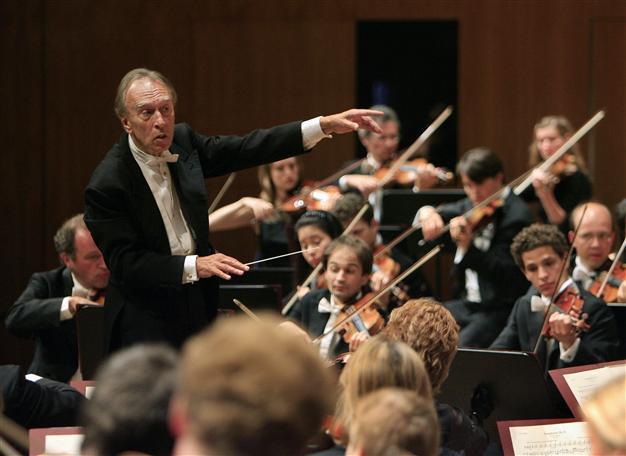Italy's mild maestro Abbado dies after stellar career
ROME - Agence France-Presse

In this Aug. 10, 2007 filer, conductor Claudio Abbado, left, conducts his orchestra during the opening concert of the Lucerne Festival in Lucerne, Switzerland. AP Photo
Italian conductor Claudio Abbado, who pushed to open the music world to a wider public and was loved by orchestras for his gentle manner, died on Monday after a stellar career that took him to La Scala in Milan, the Vienna State Opera and the Berlin Philharmonic.
Abbado believed deeply in what he called the "therapeutic values" of music and staged performances on factory floors of the 1960s, as well as promoting the Simon Bolivar Symphony Orchestra from Venezuela.
After being nominated a senator for life in the Italian parliament last year, Abbado gave away his senator's salary to provide scholarships for young musicians saying that music "helps people live better together".
Abbado was 80 years old and had been gravely ill for several months after surviving a stomach tumour in 2000, forcing him to cancel recent performances.
"Claudio Abbado died peacefully this morning at 8:30 am (0730 GMT) surrounded by his family" in Bologna in central Italy where he had been artistic director of the Orchestra Mozart, his relatives said in a statement.
Abbado made hundreds of recordings with Deutsche Grammophon, Sony and EMI, ranging from Italy's lyrical repertoire to contemporary classical music.
"This is such a painful moment," said a tearful Attilia Giuliani, head of the "Abbadiani" appreciation club in Milan.
The Berlin Philharmonic mourned "an immense and heavy loss" saying his "love of music and his insatiable curiosity have been a source of inspiration for us".
The Vienna State Opera's chief Dominique Meyer said the music world "has lost one of its very greats" and Italian Prime Minister Enrico Letta said Abbado was "an immense protagonist" in the global cultural community.
The Lucerne Festival praised Abbado's "distinctive understanding of the chamber music-like aspect of music-making, his love for the ensemble".
"He wasn't a man of big words, nor was he a fan of long rehearsal discussions. Instead, the artistic process that took shape when he conducted consisted of a kind of silent close listening," it said.
The festival said Abbado's last performance before his death was of Anton Bruckner's Ninth Symphony in Lucerne on August 26, 2013, and was an "unforgettable evening".
Abbado was "far removed and deeply transfigured," it said.
Fellow Italian maestro Riccardo Muti, director of the Chicago Symphony Orchestra, said Abbado had "marked the history of conducting for several decades".
Born on June 26, 1933, in Milan into a musical family, Abbado began his studies in his hometown and completed his training with Hans Swarowsky in Vienna from 1957 -- the start of a long love story with Austria.
He once said that he felt he was "half Viennese".
Abbado was a true Europhile and a global citizen who worked in many of the world's musical capitals.
The maestro started out at La Scala in 1960, where he was widely praised for his performance of Giacomo Manzoni's opera "Atomtod" in 1965, and he served as musical director of the celebrated theatre until 1986.
He was known as a leftist and broke with tradition by giving concerts in factories and schools, trying to involve the wider public in the classical music world.
After a trip to Venezuela, he became a major supporter of maestro Antonio Abreu's award-winning Simon Bolivar Symphony Orchestra for disadvantaged children.
In Venezuela "there are hundreds of orchestras for young people and the music really rescues them from criminality, prostitution and drugs," Abbado said. From 1971, he also became a regular at the Vienna Philharmonic and he conducted the London Symphony Orchestra between 1979 and 1988, where he was praised for concerts of his favourite composer, Gustav Mahler.
He was musical director of the Staatsoper in Vienna between 1986 and 1991, and he even received the prestigious title of musical director general of the Austrian capital -- "Generalmusikdirektor".
Abbado was elected head of the Berlin Philharmonic by its members in October 1989 after the death of Herbert von Karajan and established an excellent rapport with the orchestra, where he worked until 2002.
"I am not their boss, we work together," he used to say.
